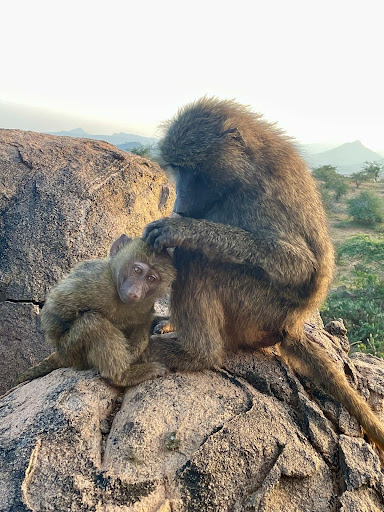
On March 20, four Northern Kentucky University students headed off to Los Angeles for the American Association of Biological Anthropologists (AABA) conference to showcase their research on juvenile baboons, their social behavior and community dynamics.
The group, led by Monica Wakefield, Associate Professor of Anthropology at NKU, presented two projects at the conference. The group of baboons were originally studied in Congo before switching to a different group in Kenya because of political instability raising concerns about student safety. The roots of the project trace back to 1984 when Dr. Wakefield’s colleague Dr. Sherly Strum, a professor at the University of California San Diego, began collecting data on baboon behavior. With the relocation to Kenya, Dr. Wakefield and her team were able to continue the research, digitizing decades worth of data into Microsoft Excel for analysis.
“The kind of rule is you do a semester of data entry, and then the next semester you can start doing research,” Dr. Wakefield explained, highlighting the hands-on approach taken by students involved in the project.
The study initially began with over 170 baboons after the population experienced an unexpected surge due to an invasive species of pear providing abundant food. However, recent years brought about significant challenges, including a severe drought in Kenya, forcing the baboons to adapt and separate into smaller groups in search of scarce resources.
“Studying baboon grooming behavior is crucial for understanding social bonding among these primates,” Dr. Wakefield emphasized. “It’s a window into their complex social structures and relationships.”
Despite the obstacles with elephants on site, problems with different versions of Excel and more, the group created and submitted two abstracts for the conference. Students have also been able to help with fundraising activities like Anthropology Day and selling bracelets created by the women’s cooperative Twala Women Cultural Center in Kenya to help the community where the research takes place.
“Because it’s all undergraduates presenting, it’s a very supportive environment,” Dr. Wakefield explained. “Big-time researchers do visit, but it’s all about walking students through it, helping them learn and grow from it and supporting their work.”
The journey to the conference was a culmination of years of hard work for the team. Jay Utz, a student and member of the team, reflected on their progress: “I have been working on this project for probably four semesters, maybe five, and what I have been doing is just general coding and putting everything into Excel, so it’s nice to see an end product of all the cumulative work that we’ve just been doing for so long.”
Many students had their own objectives at the conference, including Marissa Vestal, another team member. “One of the main things I [hoped] to get out of this is professional connections, being able to meet new people, being able to talk to grad schools specifically, but also they have a whole bunch of different talks from different experts in the field and they also have like a forum. One I am looking forward to the most, I will spend so much time at is the forum of disability,” Vestal said.
Ansley Cahill, another one of the team’s members, highlighted the importance of networking opportunities at the conference. “What I’ve been looking forward to getting out of this is more connections for me because I’m very interested in pursuing grad school, and I also would like to volunteer at more field schools,” Cahill said.
Despite the challenges faced along the way, the NKU Baboon Project remains steadfast in its commitment to advancing our understanding of baboon behavior. With their findings ready to be shared with the scientific community, the team took advantage of the opportunity to present at the AABA conference and contribute to the field of anthropology.
Students interested in joining the group for next semester should email Dr. Wakefield at wakefieldm2@nku.edu.

